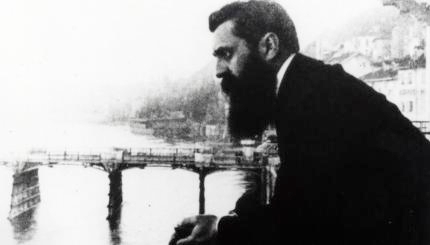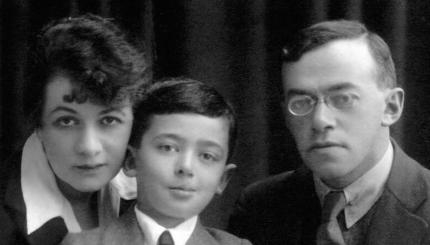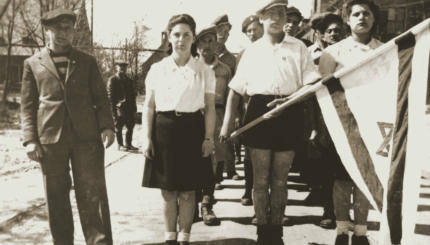The late 19th century was a time of spiritual and ideological ferment for the Jews of Eastern Europe. For many, traditional Jewish beliefs became untenable and the old observant lifestyle lost much of its appeal. In Russia, thousands of young, educated Jews rejected their religion in favor of new, revolutionary ideologies–in particular socialism and nationalism. These Jews were attracted by the promise of new truths and by the dream of a changed world. Yet the new ideologies were uncompromisingly secular and proved unable to fill the spiritual hole that, for many, had been opened up by the abandonment of traditional Judaism.
Was it possible for young Jews to find spiritual fulfillment, without eschewing their revolutionary beliefs and returning to outmoded Jewish tradition? A.D. Gordon attempted to create just such a synthesis of modernity, radicalism, and spirituality.
From Podolia to Palestine
Aaron David Gordon was born in Podolia–then part of the Russian Empire–in 1856. He worked for wealthy relatives as the manager of a large estate and was a supporter of the nascent Zionist movement. In 1904, having lost his job, Gordon decided to immigrate to the Land of Israel. Gordon was part of the Second Aliyah, the wave of Jewish immigrants who reached Palestine in the years before the First World War. But he was far from typical.
In contrast to the young, secular pioneers, Gordon was middle-aged, physically weak, habituated to white-collar work, and religiously observant (he gradually stopped observing the commandments after arriving in Palestine). Nonetheless, he threw himself into the pioneer lifestyle of hard manual labor in the agricultural settlements, first in Petah Tikva and ultimately at one of the first communal settlements or kvutzot–Degania. Working by day and writing by night, Gordon became a kind of guru for his young counterparts, both articulating and embodying the principles of a new “religion of labor.”
With your help, My Jewish Learning can provide endless opportunities for learning, connection and discovery.
Rejecting Socialism
Gordon was different from the mainstream of the Second Aliyah in one other important respect: he was not a socialist Although he emphasized the values of labor, solidarity, and social equality, Gordon was resolutely opposed to Marxism’s view that class struggle was the driving force of history. Rather, the seemingly socialist values in Gordon’s belief system derived from his uncompromisingly nationalist outlook. In “Nationalism and Socialism” Gordon wrote:
“Building a nation is not like building a society. The foundation stones are laid not merely for an improved system of economic life nor for the social justice which is desired in that life; here we are laying the foundation for a new collective life and also for a new national spirituality…All this demands a profound inner unification of all the elements of the nation where even their inner conflict, the conflict of ideas and of hopes, must be internal without the interference of an alien force or an alien influence.”
Returning to Nature
Gordon’s thought also had universal elements. He believed in the organic unity of the cosmos, of nature, and of all people. But human beings have “degraded and profaned the nature of the universe” by regarding nature as a commodity to be exploited. According to Gordon, capitalist exploitation also corrupts social relations, engendering indifference to human suffering and deprivation. The solution–the regeneration of universal nature–must therefore be achieved through the regeneration of individual human nature. But the required reorientation of human beings must itself be achieved by the immersion of human beings in nature. In his essay “Human-Nation” Gordon wrote:
“Man in his own narrow confines of life is like the worm burrowing within a bitter herb, ignorant of a better and greater world beyond his little restricted domain. A human being must broaden his horizons to include the larger life, the infinite world around him, the world with which he must maintain relations.”
How is this “immersion” to be achieved? The answer relates to the apparent contradiction between the universal and the particular in Gordon’s thought. For the Jews’ immersion in nature and their reconnection to the oneness of the cosmos was to be achieved through manual labor in the Land of Israel.
The Conquest of Labor
In “People and Labor,” Gordon wrote that, “the Jewish people has been completely cut off from nature and imprisoned within city walls these two thousand years…We lack the habit of labor–not labor performed out of external compulsion, but labor to which one is attached in a natural and organic way. This kind of labor binds a people to its soil and to its national culture.”
The “conquest of labor” was a central plank in the platform of all varieties of socialist Zionism, as a means toward the creation of an economically self-sufficient, egalitarian Jewish society. But instead of socialism, Gordon was influenced by the romantic attitude to the land associated with Tolstoy and the Russian Narodnik movement. As such, his focus was not primarily economic, but spiritual. Gordon believed that Diaspora existence had crippled the Jewish people, cutting it off from its essential source of sustenance, and forcing it to survive through the dried up resources of history and religion. The revival of the Jewish people demanded the reestablishment of the bond between the Jews and their land. Employing vivid biological metaphors, Gordon wrote in “Our Tasks Ahead”:
“We come to our Homeland in order to be planted in our natural soil from which we have been uprooted, to strike our roots deep into its life-giving substances, and to stretch out our branches in the sustaining and creating air and sunlight of the Homeland…Here, in Palestine, is the force attracting all the scattered cells of the people to unite into one living national organism.”
As a religious–almost mystical–thinker, Gordon was something of an anomaly in the resolutely secular Zionist Labor movement of the early twentieth century. Yet the “religion of labor” advocated in his writings provided an inspiration for generations of Zionist pioneers and was the driving force behind the settlement of the land, the creation of a Jewish economy, and the ultimate establishment of the State of Israel.
Gordon’s Relevance Today
A century later, Gordon’s worldview seems increasingly incompatible with the values of Israeli society. Far from prizing labor, many Israelis are unwilling to undertake physical work in agriculture or industry. Those who are forced to take on these low paying jobs are not an ideological elite, but represent the bottom of the social pile. In an era when Israeli Jews aspire to work in high-tech and the free professions–reflecting a return to traditional diasporic occupational patterns–do A.D. Gordon’s ideas have anything to teach us?
Gordon’s most obvious audience is the contemporary settler movement, whose all-consuming goal is to sink roots in the Land of Israel through creating Jewish settlements in Judea and Samaria (the West Bank). However, although they agree with Gordon about the importance of settling the land, a minority of today’s settlers share his estimation of manual labor’s supreme importance. Moreover, since the Oslo Accords and the Disengagement Plan, the very future of the settlement enterprise is under direct threat. Perhaps Gordon’s ideas are relevant to the establishment of new agricultural settlements in the Galilee and the Negev, but these are marginal ventures in today’s Israel.
A second opening for Gordon’s values is the area of environmentalism. For Gordon, the goal of the return to labor, and of Zionism itself, was the repair of human nature and, ultimately, of universal nature. The idea that industry should serve rather than damage nature mandates the curbing of consumerist excess and the shaping of the economy in line with the principles of sustainable development and environmental protection. In this sense, Gordon’s message takes on global, rather than purely Jewish-Israeli significance.
Finally, modern Israel suffers from a wide gap between rich and poor (among developed countries, only the USA has a higher inequality index), the erosion of workers’ rights, and the employment of migrant workers at salaries so low that Israelis cannot afford to take the jobs. Gordon’s belief in the dignity of labor combined with his passion for social justice provide a trenchant critique of this state of affairs.
Yet Gordon’s relevance is that his commitment to equality sprang not from doctrinaire and possibly outdated ideology, but from a basic faith in national and human solidarity. In “Human-Nation” he wrote: “Most clear-thinking people now feel that no man with a soul can be happy in the possession of luxuries while there are those in want of the material necessities of life. Neither can a regenerated humanity rest content in its spiritual wealth when there are so many whose souls are poverty-stricken.”


